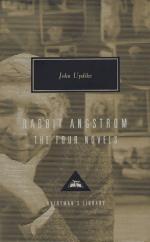|
This section contains 1,319 words (approx. 5 pages at 300 words per page) |

|
SOURCE: “Desire under the Palms,” in New York Times Book Review, February 6, 1994, pp. 1, 26–7.
In the following review, Kingsolver offers a positive evaluation of Brazil, but objects to racial stereotypes and elements of misogyny in the book.
Tristão and Isabel, the hero and heroine of John Updike's 16th novel, Brazil, never quite realize the epic valor of their name-sakes of medieval legend and Wagnerian drama. They mean well, but they just can't seem to resist silk shirts and kinky sex.
The knight-errant, Tristão is strutting the Copacabana beach in his shining armor of night-black skin when he first lays eyes on pale Isabel, in her bikini and rich-girl languor. “This dolly,” he declares, “I think she was made for me.” With a razor blade in his pocket and the vague sense that he has outgrown a life of crime, Tristão makes his way to her, pledging...
|
This section contains 1,319 words (approx. 5 pages at 300 words per page) |

|


